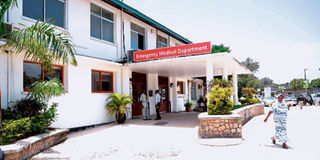Lives at risk as water crisis hits Muhimbili

A section of Muhimbili National Hospital. Tanzania’s biggest referral hospital has been grappling with an acute water shortage for the past two weeks. PHOTO | FILE
What you need to know:
- Responding to our enquiries on the situation, the MNH Public Relations Officer, Mr Aminiel Aligaeshi, admitted in a telephone interview that the water woes have been there for over two weeks.
Dar es Salaam. Tanzania’s leading referral facility, the Muhimbili National Hospital (MNH), has been contending with an acute water shortage for the past two weeks, The Citizen can report.
Observers view the current situation at the hospital as an appalling one which might lead to an outbreak of epidemics that would affect hundreds of patients who are referred there from all corners of the country.
The 3,000-bed medical facility, which admits between 1,000 and 1,200 inpatients while attending to between 1,000 to 1,200 outpatients daily, had been battling with a serious water problem since July 15. The Citizen survey at the hospital compounds and the wards shows that patients were going through a hard time like being forced to spend days without taking a bath. The situation is worse in the washrooms and toilets where running water is the key word, yet it isn’t there.
Responding to our enquiries on the situation, the MNH Public Relations Officer, Mr Aminiel Aligaeshi, admitted in a telephone interview that the water woes have been there for over two weeks.
He noted that the hospital needs at least 2.2 million litres per day, but from July 15 to date, it has been receiving less than 60 per cent of its needs.
According to him, the scarcity is mainly caused by low pressure and disconnection of pipes to pave the way for on-going upgrading of the Morogoro road.
“It is true that the hospital is facing a serious water shortage, but the management has been doing all it can to make sure everything runs as it should,” said Mr Aligaeshi.
He said MNH has already talked to Dar es Salaam Water and Sewage Corporation (Dawasco) and Tanzania National Roads Agency (Tanroads) to see how the road project can be proceed without disrupting water flow to Muhimbili.
He added that the management has moved to alleviate the crisis by purchasing some water from private dealers.
Speaking to The Citizen, a number of patients said the situation was exposing them to new infections, adding that the water shortage also increases the use of disposables, thereby increasing the cost of their stay at Muhimbili.
They added that bed sheets and ward uniforms were getting unbearably dirty. One of the patients, Ms Violet Mduda, said they get water in the morning only and that was just for a very brief period.
She said there are some days when not even a single drop of the precious liquid flows from the taps in their ward.
“I’m worried; I do not know if I will manage to make it like this. As of yesterday, we haven’t had any running water after it abruptly ran out as I was in the bathroom taking a shower,” she lamented.
She added that the situation was much worse when it comes to patients who are poor while every patient should be able to buy at least a 12-litre bottle for drinking and washing.
“The situation is more complicated for women as we are sensitive to exposure to untidiness, so there are many of us who are now suffering from urinary tract infections,” explained the patient.
Ms Zukra Yusuf, a relative to one of the patients admitted at the Sewahaji Block said relatives and patients were restricted from preserving water cans in the ward.
“We are going this rough situation but still guards and nurses don’t allow us to keep water in cans, it is only the well-to-do who can afford buying water from the shops every day,” she said, adding:
“We were referred from Mtwara Regional Hospital, but it seems we are unlucky since the situation threatens our presence in this area.”
A nurse, who asked not to be named, said the water crisis has made life hard for both patients and hospital staff.
“We are extremely worried because infection control is compromised and there’s little we can do,” she said.
The country’s leading medical facility was established between 1910 and 1920s when it was known as Sewahaji Hospital. In 1956, its name changed to Princess Margareth Hospital. Soon after independence in 1961, it was rechristened Muhimbili Hospital, a name it retained until 1976 when it was changed to Muhimbili Medical Centre.


